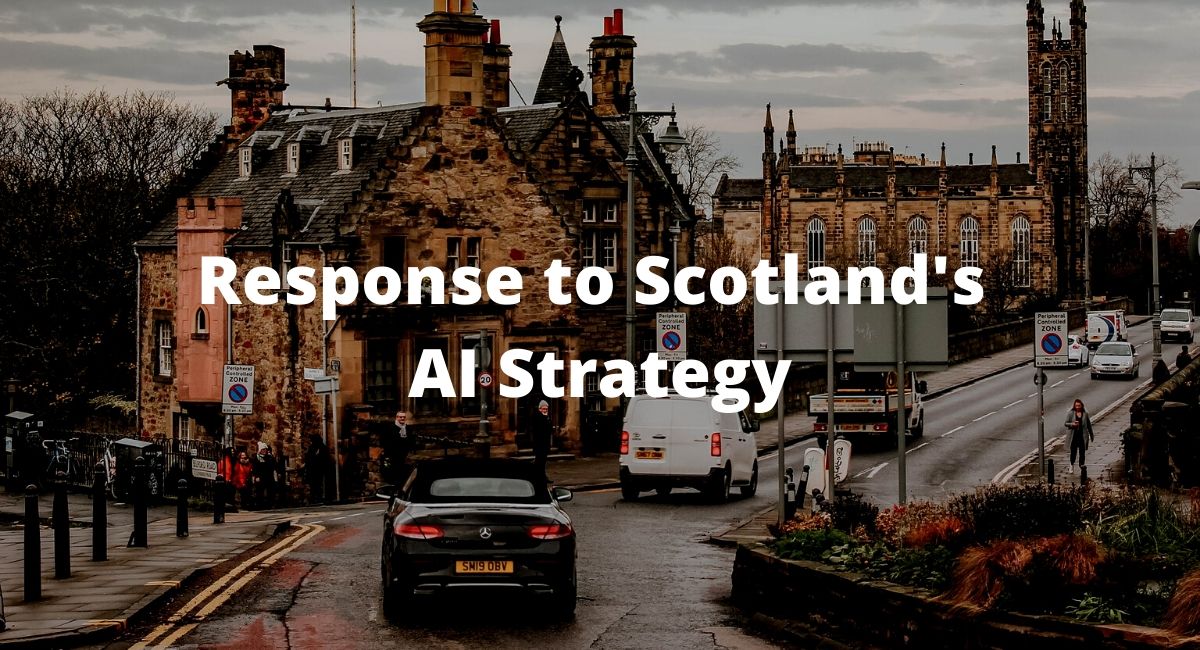
Below is an excerpt from the full report. The Scotland documents we’re responding to: Scoping Document, Consultation Paper.
What do you think of the proposed definition of AI for the purposes of the strategy?
The proposed definition captures the essence of the meaning of Artificial Intelligence (AI) and while there isn’t widespread consensus on its definition across the various groups that use the phrase, we propose adding a subtext to the definition to capture the fluidity and nuance of AI. Specifically, the term AI has over time shifted significantly in what it means and there are differences in perception of the term by the wider public compared to the intended definition as put forth by an organization. For example, the work from Lipton and Steinhardt highlights how 1 terms such as AI have social implications which can create widening gaps between reality and expectation because of concepts like suggestive definitions which communicate ability that means various things to the public which are different from the actual capabilities of the system. So when talking about concepts like visual perception, speech recognition, and decision-making, there is a certain expectation that is set that gives the impression that these systems exhibit human-like intelligence characteristics when in fact it has been shown in various forms that the representations captured by these systems are in fact quite brittle, vulnerable to attacks , and don’t necessarily demonstrate intelligence in the humanistic sense where it is 2 general enough to translate from one domain to another without significant retraining and re-tooling of the system, even in the case of narrow domains . 3
Moreover, from a policy and regulation perspective, when utilizing a definition that conveys human-like intelligence implications leads to problems of anthropomorphization of these technologies which can lead to over-regulation and a chilling effect on investments and 4 development of the field. This problem is exacerbated by problems of misrepresentations of the capabilities of the system , both intentional and unintentional, by journalists, companies, 5 researchers, and others for various purposes which leads the public astray sparking unwarranted fears and discussions while distracting from more meaningful and immediate 6 concerns that need to be considered when crafting a national strategy for promoting responsible, safe, and ethical development of AI.
Additionally, we’d like to point out that there are tasks achieved by AI systems today that don’t have clear parallels in terms of human intelligence and aren’t effectively captured by the proposed definition. As an example, the nudging and shaping of human behaviour on large social media platforms isn’t something that human intelligence can be known to exhibit in a 7 traditional sense. Specifically, a lot of it is emergent from both directed efforts by the undergirding platform algorithms to achieve specific goals (say for example, higher clickthrough rates and engagement on content to generate ad revenues ) and undirected efforts as humans 8 interact with each other and the platform dynamics to achieve their own goals such as seeking out information, connecting with others, etc.
Speaking just of computers in the definition also has limitations in terms of the perception that is created when thinking about the devices where such intelligence is captured, especially as we move towards embedding this into all sorts of devices that operate in the background, fading into ambient intelligence with the Internet of Things (IoT) as an accelerant for this trend. Thus, 9 the use of the word “computers” may create a false expectation without further clarifying that what is meant by that is “computing devices” which captures other devices as mentioned above which can also exhibit rule-based or intelligent behaviour that should be considered, especially as edge computing becomes more powerful and computations, learning, and inference are not 10 only performed in centralized data centers. Platforms where interactions are mediated by both artificial and human agents also don’t strictly fall into this framing of the definition as the 11 “intelligence” is captured in a more distributed sense causing significant shifts in people’s 12 behaviour.
From a regulatory standpoint and incorporating this into the definition as it relates to the AI strategy, it will be of paramount importance to articulate these nuances as a supplemental subtext to the primary definition proposed or by revising and expanding the proposed definition such that these expectations are made clear and lead to meaningful and measured strides in investments for AI development and directing regulatory oversight in an appropriate manner.
